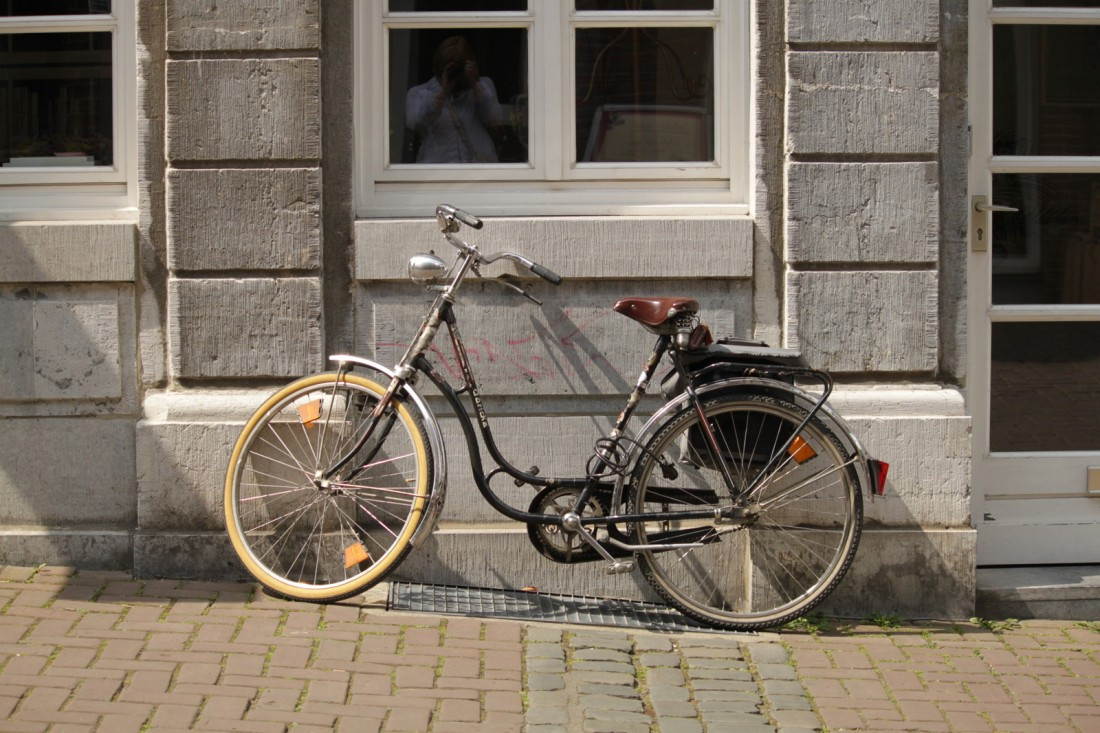Riding Dutch
Plain Bicycle Project to bring Dutch bicycles to Winnipeg
A local couple is calling on bike lovers, cyclists and anyone who’s interested in owning a refurbished Dutch bike to join the Plain Bicycle Project and experience life behind the handlebars.
Project founders Anders Swanson and Leigh Anne Parry hope to bring a shipping container filled with refurbished Dutch bicycles from the Netherlands to Winnipeg. At least 100 orders are needed for the project to go through.
For $250 plus tax and PayPal fees, supporters get to keep the Dutch bike and the money goes to cover the costs of shipping bicycles to Winnipeg, which could be anywhere from $4,000 to $7,000, total.
Both Swanson and Parry own Dutch-style bicycles, which Parry describes as comfortable.
“You don’t feel like you’re physically active, you’re just going somewhere,” Parry says. “You can wear whatever you want. You just get on and go. No gears to switch. There’s a self containing lock which you can lock and leave your bike anywhere.”
Dutch bicycles, called an omafiets (granny bike) in the Netherlands, are characterized by their step-through frames designed for women wearing dresses and skirts to easily hop on and off their bicycles. Now considered a unisex bike, they require the rider to sit upright and are suitable for most weather conditions. Often, more than one person can be seen on a single Dutch bike.
“The Dutch bikes, the idea is that they’re as bomb-proof as you can make a bike,” Robin Bryan, general coordinator of the UWSA Bike Lab says. Dutch bikes differ from other bikes typical sold in North American shops that are geared towards performance and fitness, and often feature more expensive components that also require more maintenance, Bryan says.
These types of bikes cater to a versatile demographic in the Netherlands and users range in age.
Swanson, an independent consultant who specializes in transportation, recently travelled to The Hague, Netherlands with Parry to attend conferences where they observed the contrast in bicycle culture between Winnipeg and the Netherlands.
“It’s hard to describe, but basically, there are no cyclists in the Netherlands. It is something for everyone. It will happen here, it’s just a matter of time,” he adds.
The founders think there’s room for improvement for bike infrastructure in Winnipeg.
“The question is not whether we should have more bike paths. The question is why the hell don’t we have bike paths already. It’s quite absurd,” Parry says.
“It’s common sense to have bike lanes on all roads. The fact that we don’t have bike lanes on all roads is like shooting ourselves in the foot.”
Beth McKechnie, a workplace commuter options coordinator at the Green Action Centre in Winnipeg, has backed the project and recognizes its potential for everyday bicycle commuting in the city.
“In North America, we see cycling as a sporting activity but the Dutch bikes really help you get from point A to point B. You can wear regular clothing and be seen using it,” she says.
“(Dutch bikes) are geared towards not just everyday riding and comfortable riding, and I think that’s probably a good thing for a lot of people who may see entry into bikes as a high-performance, fitness-based sporty thing,” Bryan says.
“That’s not the way it is in many places in Europe, and we can maybe start to change our culture by shifting it towards comfortable, practical cycling.”
So far 47 people have joined the Plain Bicycle Project. Depending on how quickly the minimum is reached, the bicycles should arrive by spring. To back the project or learn more about it visit plainbicycle.org.
Published in Volume 70, Number 16 of The Uniter (January 21, 2016)








